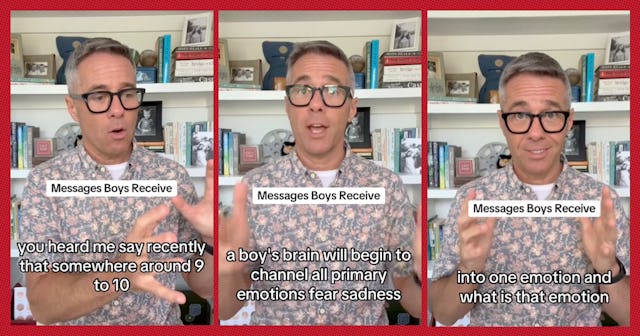This Therapist Explains How We Teach Boys To Be Angry In Place Of Other Emotions
Here’s what to tell boys instead of, “Stop crying” and “Man up.”

One licensed therapist and counselor on TikTok is doing the work to help educate and inform parents on how to raise a mentally healthier, more emotionally available son. On the account @raisingboysandgirls, licensed counselor and therapist, David Thomas, spoke about the messages boys receive and how we need to do the work to switch up that messaging.
“...around 9 to 10, a boy's brain will begin to channel all primary emotions — fear, sadness, confusion, disappointment — into one emotion. And what is that emotion? It's anger,” Dr. Thomas begins.
“And culturally, I think we send messages to boys that say it's okay to be angry, it's not okay to be sad. It's okay to be angry, it's not okay to be afraid or worry. So we're gonna have to push against these messages. And if that instinctive process is already happening somewhere around 9 to 10, and then on top of that, he's getting these different messages coming at him that are saying some version of, ‘Don't feel. Don't ask for help.’”
Dr. Thomas also says that the classic and totally toxic phrase, “Man up!” needs to go out the window before he explains what that phrase actually means on a larger scale.
“If we really dissect that, if we really think about what's within that wording, I think there are those messages of ‘stop feeling, stop having emotions, don't ask for help, take care of yourself.’ You know, think about all the different things that we tend to say to boys like, ‘You need to stop crying. That's not a big deal.’ Those messages, if we're really paying attention, are full of those instructions of ‘Don't feel, don't ask for help.’”
These kinds of messages are toxic, setting our sons up for total failure when it comes to being vulnerable, processing emotions in a healthy manner, and just being cooperative members of society. Dr. Thomas says we need to communicate to boys to really feel their feelings — whatever they may be. We need to reiterate to them that asking for help is always a good option when you feel stuck or confused.
He continues, “So rather than saying, you know, ‘Stop crying.’ I want boys to hear things like, “Let's work it through. I can tell you're having some big feelings. Let's work it through.’”
This kind of messaging shows that we, as parents, are there with them to help with an issue or big feeling while also bringing down that heightened state of arousal that could explode into anger. The goal is, ultimately, to move from a co-regulation solution to a self-regulation solution like teaching kid to ride a bike. It all takes practice. We have to go about it in steps.
“If they fall off the bike and get hurt, we're going to offer some comfort and support and help them dust off and get back on, hopefully, and go forward,” he said before offering up another alternative message when we feel like we just want to tell our angry sons to “calm down.”
“I want you to think how often we even say to boys things like, ‘Calm down, you need to calm down.’ And I think sometimes we say that, and we've not taught the skills of how to do that. Dr. Thomas says we just assume that young people know how to do this, but like playing an instrument, we usually have no idea. We need practice. We need guidance. It’s the same for kids.